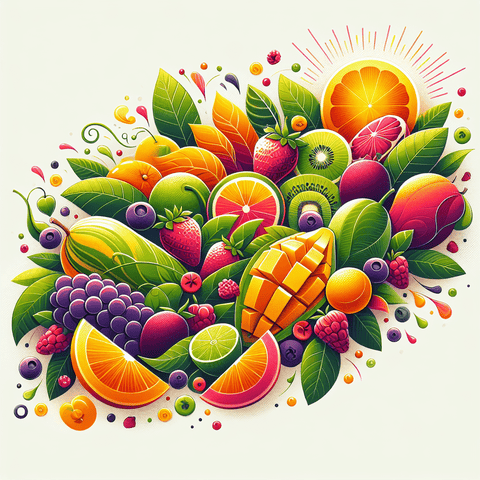Introduction
Vitamins are essential micronutrients that our bodies require for a broad range of biological functions, from immune system support to bone health, energy metabolism, and more. These organic compounds are vital in small amounts, yet deficiencies can lead to serious health complications. As our bodies cannot synthesize most vitamins on their own, they must be obtained from external sources—primarily food.
Fruits, in particular, are among the most potent natural sources of these crucial nutrients. They do not only taste great and are easy to incorporate into our diets, but they also provide a wide array of vitamins along with beneficial phytonutrients, antioxidants, and dietary fiber. Whether you're looking to improve skin health, boost immunity, support your cardiovascular system, or enhance your overall vitality, fruits provide an excellent way to meet your daily vitamin requirements.
The aim of this blog post is to explore the world of vitamin-rich fruits. We'll dive deep into which fruits contain the highest concentrations of essential vitamins, how they support our health, and how to best incorporate them into your diet. Furthermore, we'll explain how natural fruit-based nutrition can complement dietary supplementation. Whether you’re considering a new wellness routine or want to optimize your current vitamin intake, this guide will equip you with the knowledge to make informed decisions.
1. Vitamins in Fruit: Natural Powerhouses for Your Nutritional Needs
Fruits are dense with a variety of vitamins, each offering unique health benefits. These include vitamins A, C, E, K, and an assortment of B-complex vitamins like B1 (thiamine), B2 (riboflavin), B3 (niacin), B6 (pyridoxine), B9 (folate), and B12 (although B12 is generally not found in significant quantities in plant-based foods).
Vitamin A is found in fruits such as mangoes, cantaloupes, and apricots in the form of beta-carotene, which the body converts to retinol. This vitamin is crucial for vision, immune function, and cell growth.
Vitamin C, perhaps the most well-known vitamin, is abundant in citrus fruits like oranges, grapefruits, lemons, and limes. It plays a pivotal role in collagen synthesis, wound healing, immune defense, and enhances the absorption of iron from plant-based food sources. For those looking to boost their immune system, a regular intake of vitamin C–rich fruits is beneficial. Discover more about its properties here.
Vitamin E, a powerful antioxidant, is found in small but beneficial amounts in fruits such as kiwis, mangos, and avocados. It helps in protecting cell membranes from oxidative damage and supports immune function.
Vitamin K is present in fruits like kiwi, grapes, and blueberries. This vitamin contributes to blood clotting and supports bone metabolism. A deeper understanding of vitamin K’s health impact can be gained here.
B-complex vitamins are found in bananas, avocados, and citrus fruits. These vitamins play a role in converting food into energy, maintaining nerve function, and supporting head-to-toe physiological processes.
The bioavailability of these vitamins in fruits depends on the fruit type, preparation method, and storage condition. For instance, vitamin C is heat-sensitive and can degrade during cooking. Hence, eating fruits raw or minimally processed preserves their nutrient composition. Opting for fresh and ripe fruits ensures maximum vitamin potency since many vitamins degrade with time after harvest.
Moreover, unlike synthetic vitamin supplements that isolate specific nutrients, fruits offer vitamins in a matrix of fibers, enzymes, and phytonutrients that may improve nutrient absorption and efficacy. This makes fruits not only vital to meeting daily nutritional requirements but also a superior choice in many cases for obtaining bioavailable vitamins naturally.
2. Fruit Vitamin Content, High Vitamin Fruits: Top Natural Sources of Essential Vitamins
Not all fruits are created equal in terms of their vitamin profiles. Some are considerably more nutrient-dense and can contribute a significant percentage of your daily vitamin requirements even with a modest serving size. Let’s break down some of the top vitamin-rich fruits and their nutritional components.
Citrus Fruits (Oranges, Lemons, Limes, Grapefruits): These are powerhouses of vitamin C, with one medium orange delivering about 70 mg of vitamin C, almost 80% of the recommended daily value. Grapefruits also contain an appreciable quantity of vitamin A and folate.
Guava: One of the most concentrated sources of vitamin C—four to five times more per 100 grams than oranges. A single guava can supply over 200% of the daily vitamin C needs. Additionally, guava is high in vitamin A, folate, and dietary fiber.
Kiwi: Rich in vitamins C, E, and K, kiwi also contains potassium and a variety of antioxidants. A single medium-sized kiwi fruit provides roughly 230% of the recommended dietary intake of vitamin C.
Papaya: This tropical fruit is a great source of vitamin A (as beta-carotene) and vitamin C. One small papaya can cover more than 100% of your daily vitamin C requirement and support skin and eye health.
Blackcurrants and Strawberries: These berries are high in vitamin C and provide other essential nutrients like manganese and folic acid. Their antioxidant content, particularly anthocyanins, contributes to reduced oxidative stress.
Passion Fruit: A strong candidate for vitamin A content, passion fruit also offers a fair amount of vitamin C, iron, and dietary fiber. Just 100 grams provides about 25% of your vitamin A needs.
Mangos and Apricots: Both these fruits contain beta-carotene, which the body converts into vitamin A, as well as vitamin C. For those looking to enhance skin and eye health, mangos are an excellent choice.
Comparatively, 100 grams of guava provides about 228 mg of vitamin C, while the same amount of orange offers 53 mg. Similarly, 100 grams of kiwi delivers approximately 92 mg of vitamin C. When it comes to vitamin A, mango provides about 54 ug per 100g, while papaya delivers 47 ug. The differences highlight the importance of variety in fruit consumption to maximize vitamin intake across the spectrum.
To incorporate these high-vitamin fruits into your daily diet, consider blending them into smoothies, slicing them over your morning cereal, or simply eating them as snacks. Rotating different fruits weekly ensures you gain a broad spectrum of nutrients. While supplements are helpful, especially where dietary deficiencies exist, complementing them with real food sources like fruits ensures better nutrient utilization and overall wellness.
3. Nutrient-Rich Fruits, Best Vitamin Sources in Fruit: Maximizing Your Intake of Essential Nutrients
Nutrient-rich fruits are those that provide a high concentration of vitamins, minerals, and beneficial compounds relative to their caloric content. These fruits not only help in meeting individual vitamin needs but also support bodily systems holistically. They play a critical role in both preventive nutrition and therapeutic diets.
Kiwi: Kiwi is one of the most nutritious fruits per serving. Beyond its high vitamin C content, it also contains a significant amount of vitamin K, vitamin E, potassium, and folate. A single kiwi has more vitamin C than an orange and also offers antioxidants such as lutein and zeaxanthin for eye health.
Guava: It is hard to beat guava when it comes to nutrient density. Rich in vitamin C, folate, and fiber, it promotes immune defenses, heart health, and digestion. Guava seeds contain healthy fats, adding to its profile as a complete fruit.
Papaya: Apart from vitamins C and A, papaya contains digestive enzymes like papain, which support gut function. Its anti-inflammatory properties make it a favorite in functional diets. Additionally, papaya is low in sugar, making it a great option for people watching their blood glucose levels.
Avocado: Though botanically a fruit, avocado is unique for its healthy fat content, specifically monounsaturated fats. It contains high levels of vitamin E, B vitamins (especially B5 and B6), folate, and potassium. Avocados support cardiovascular function, nerve transmission, and muscle health.
Pomegranate: While not a traditional vitamin leader, pomegranates are rich in vitamin K and C. Moreover, they are packed with powerful polyphenols which exhibit antioxidant properties. This combination supports both bone health and oxidative stress management.
To preserve their vitamin content during preparation, fruits should ideally be consumed fresh. Cutting and then refrigerating can lead to nutrient degradation, particularly vitamins sensitive to air and light such as vitamin C. If storage is necessary, keep the cut fruit in airtight containers in the fridge and consume within a day or two. Avoid prolonged boiling or exposure to high heat, which can destroy sensitive vitamins.
Organic and locally grown fruits are generally higher in nutrient density, as they are often harvested at peak ripeness. Seasonal consuming also ensures you're getting fruits at their nutritional best. You can pair these fruits with nutritional supplements like magnesium to achieve synergistic benefits, promoting everything from energy production to hormone regulation and muscle health.
4. Natural Vitamin-Packed Fruits: Boost Your Health with Nature's Best
Natural, unprocessed fruits deliver vitamins in their most complete and absorbable form. The synergy of vitamins, antioxidants, dietary fiber, and phytochemicals present in whole fruits creates a combined effect more potent than that of isolated nutrients. Here are some standout fruits that offer the most vitamins per edible serving:
Strawberries: One cup provides approximately 150% of the daily requirement for vitamin C. The fruit also contains folate, manganese, and a host of bioflavonoids that bolster immune response and skin resilience.
Blueberries and Blackberries: Not only are they rich in vitamin C, fiber, and vitamin K, but they also contain anthocyanins—potent antioxidants associated with improved brain function and reduced inflammation.
Mangoes: Besides being a rich source of vitamin C, mangoes can provide up to 130% of the daily recommended value of vitamin A per serving. They're great for skin, vision, and cellular health.
Apricots: High in both beta-carotene and vitamin E, apricots support cellular repair and immune function. They are especially valuable during seasonal transitions when immunity may wane.
Cantaloupe: Offers about 100% of the recommended daily intake of vitamin A and approximately 95% of vitamin C per cup. It is hydrating, fibre-rich, and supports both skin and immunity.
Naturally vitamin-packed fruits can complement dietary supplements to create a full-spectrum nutrition strategy. While supplements offer targeted nutrients, fruit consumption ensures that you receive a range of co-factors and fiber that support healthy absorption and use of those vitamins. Learn more about natural alternatives to support your daily intake through vitamin D supplements or Omega-3 fatty acids.
For individuals seeking to maintain a fully balanced nourishment plan, blending fruit consumption with effective supplements broadens health outcomes. Adding a bowl of mixed berries to your breakfast or a papaya salad into your dinner plan is not just enjoyable—it’s strategically sound nutritional planning.
5. The Role of Fruits in Enhancing Nutritional Supplement Regimens
Fruits and supplements serve complementary roles in meeting your health and nutritional needs. While fruits are natural and bioavailable sources of vitamins, supplements provide a convenient and reliable way to fill gaps that fruit intake alone may not cover—especially for people with specific health conditions, dietary restrictions, or higher nutritional needs.
Integrating vitamin-rich fruits with supplements ensures you’re getting a broad spectrum of nutrients. A breakfast of kiwi and yogurt, for example, can be enhanced by taking a magnesium supplement to support muscular and nervous function. Similarly, for those with limited sunlight exposure, combining mangos or papayas with a vitamin D supplement supports both vitamin D and A levels, important for bone and immune health.
Natural food sources often contain co-factors and enzymatic compounds that optimize nutrient synergy—boosting the effectiveness of supplements. For instance, vitamin C from citrus fruits improves iron absorption from plant sources and many multivitamin supplements.
Another advantage of integrating fruit in a supplement regimen is the antioxidant support it provides. Many fruits combat oxidative stress, which may improve the cellular utilization of particular vitamins and minerals. For instance, the antioxidants in berries can aid lipid peroxidation control, important when supplementing with Omega-3 fatty acids from products like DHA/EPA-rich supplements.
Practical ways to combine fruits with supplements include setting a fixed mealtime strategy. Take water-soluble vitamin supplements (like vitamin C and B vitamins) with breakfast fruits. Use supplements like vitamin D, which is fat-soluble, at meals that include healthy fats from avocados or nuts for optimal absorption.
By combining supplement intake with naturally vitamin-packed fruits, you optimize nutrient absorption, balance energy levels, and maintain a powerful defense against nutritional deficiencies.
6. Conclusion
Fruits are a nutritional treasure trove, delivering a diverse spectrum of essential vitamins that are foundational to human health. From guava and kiwi to mango, papaya, and berries, incorporating a variety of natural, vitamin-rich fruits into your everyday meals is both practical and effective for meeting your vitamin requirements.
Throughout this article, we've examined the various vitamins found in fruits, identified those with the highest concentrations of key nutrients, and offered insights into maximizing intake. Fruits like guava, kiwi, strawberries, mangoes, and papayas stand out as some of the most vitamin-rich choices.
Whether you're relying on whole foods for your micronutrient needs or using vitamins and minerals as dietary supplements, fruits play an irreplaceable role. They help you achieve a balanced diet, enhance bioavailability, and offer health benefits that go beyond what isolated supplements can provide.
By combining high-vitamin fruits with scientifically backed dietary supplementation, you ensure that your body performs at its best. We encourage you to mix and rotate fruits, experiment with creative recipes, and explore complementary supplements available through the Topvitamine.com collection to support your wellness journey.
Q&A Section
Q1: Which fruit has the highest vitamin C content?
A: Guava is one of the richest fruits in vitamin C, offering over 200% of the daily value in a single serving.
Q2: What fruits are best for vitamin A?
A: Mango, papaya, cantaloupe, and passion fruit provide significant amounts of Vitamin A as beta-carotene.
Q3: Can I rely on fruits entirely for my vitamin intake?
A: While fruits provide a wide array of essential vitamins, combining them with supplements can ensure you meet the full Range of daily nutritional needs, especially for nutrients like vitamin B12 or D, found minimally or not at all in fruits.
Q4: Are fresh fruits always better than dried or canned fruits?
A: Fresh fruits are preferable as they maintain the highest vitamin content. Dried or canned fruits may lose vitamins like C due to processing.
Q5: How do supplements work with fruit-based diets?
A: Supplements can fill gaps that a fruit-based diet may not address and can work synergistically to enhance vitamin absorption and functionality.
Important Keywords
Vitamin-rich fruits, high vitamin fruits, vitamins in fruit, nutrient-rich fruits, natural vitamin-packed fruits, best vitamin sources in fruit, vitamin C in fruit, fruits with vitamin A, vitamin supplements and fruit, bioavailability of fruit vitamins, guava vitamin C, mango vitamin A, kiwi vitamin profile, dietary supplements and fruit, Topvitamine vitamin products.



